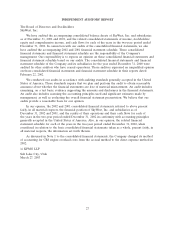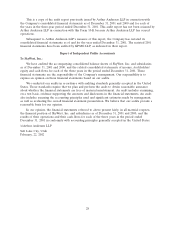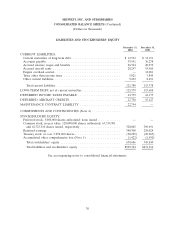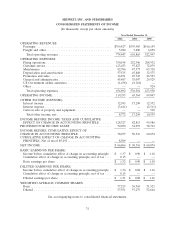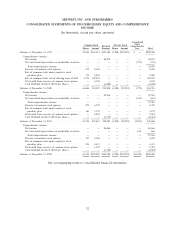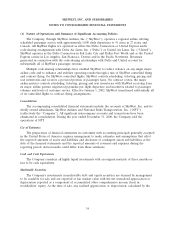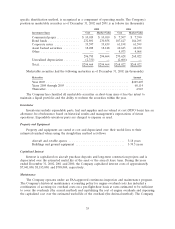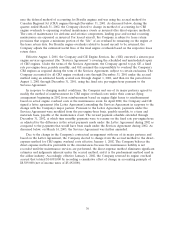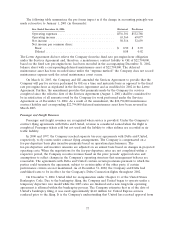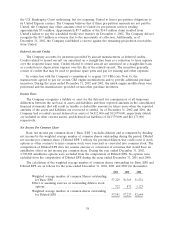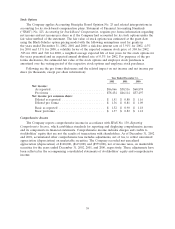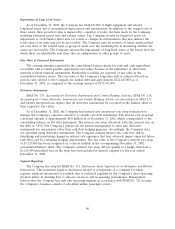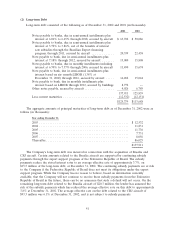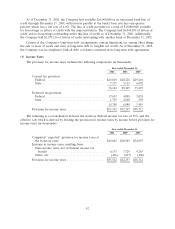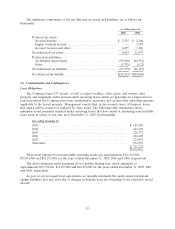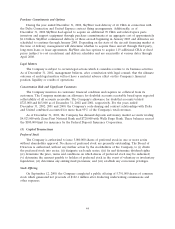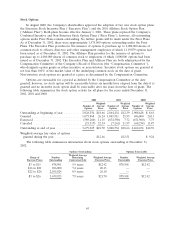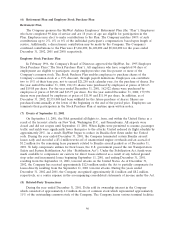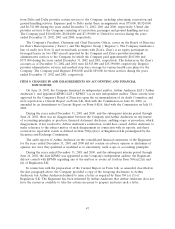SkyWest Airlines 2002 Annual Report Download - page 41
Download and view the complete annual report
Please find page 41 of the 2002 SkyWest Airlines annual report below. You can navigate through the pages in the report by either clicking on the pages listed below, or by using the keyword search tool below to find specific information within the annual report.
The following table summarizes the pro forma impact as if the change in accounting principle was
made retroactive to January 1, 2001 (in thousands):
Year Ended December 31, 2001: Historical Pro Forma
Operating expenses ................................ $536,301 $532,788
Operating income ................................. 65,564 69,077
Net income ..................................... 50,516 52,659
Net income per common share:
Basic ........................................ $ 0.90 $ 0.93
Diluted ....................................... 0.88 0.92
The Letter Agreement did not relieve the Company from the fixed rate per-engine-hour obligation
under the Services Agreement and, therefore, a maintenance contract liability to GE of $22,794,000,
based on the fixed rate per-engine-hour, has been recorded in the accompanying December 31, 2002,
balance sheet with a corresponding deferred maintenance asset of $22,794,000. The deferred
maintenance asset has been recorded since under the ‘‘expense method’’ the Company does not record
maintenance expense until the actual maintenance event occurs.
On March 14, 2003, the Company and GE amended the Services Agreement to provide that the
Company will pay for services performed by GE on a time and materials basis as opposed to the fixed
rate per-engine-hour as stipulated in the Services Agreement and as modified for 2002 in the Letter
Agreement. Further, the amendment provides that payments made by the Company for services
completed since the effective date of the Services Agreement (August 1, 2001) shall be considered to
be in satisfaction of all amounts owed by the Company for work performed under the Services
Agreement as of December 31, 2002. As a result of the amendment, the $22,794,000 maintenance
contract liability and corresponding $22,794,000 deferred maintenance asset have been reversed in
March 2003.
Passenger and Freight Revenues
Passenger and freight revenues are recognized when service is provided. Under the Company’s
contract flying agreements with Delta and United, revenue is considered earned when the flight is
completed. Passenger tickets sold but not used and the liability to other airlines are recorded as air
traffic liability.
In 2000 and 1997, the Company reached separate ten-year agreements with Delta and United,
respectively, to fly routes under contract flying arrangements. The Company is compensated on a
fee-per-departure basis plus incentive payments based on operational performance. The
fee-per-departure and incentive amounts are adjusted on an annual basis based on changes in projected
operating costs. When the negotiations for the fee-per-departure rates are not completed within a
respective period, the Company records revenues based on the prior periods’ approved rates and
assumptions to reflect changes in the Company’s operating structure that management believes are
reasonable. The agreements with Delta and United contain certain provisions pursuant to which the
parties could terminate the agreement, subject to certain rights of the other party, if certain
performance criteria are not maintained. As of December 31, 2002, the Company and Delta had
established rates to be in effect for the Company’s Delta Connection flights throughout 2002.
On December 9, 2002, United filed for reorganization under Chapter 11 of the United States
Bankruptcy Code. Due to the bankruptcy filing, the Company and United began to operate under a
temporary departure rate model while the 2003 rates are finalized and a new long-term operating
agreement is affirmed within the bankruptcy process. The Company estimates that as of the date of
United’s bankruptcy filing, it was owed approximately $14.0 million for United Express services
rendered prior to the filing. It is the Company’s understanding that United has received approval from
37


